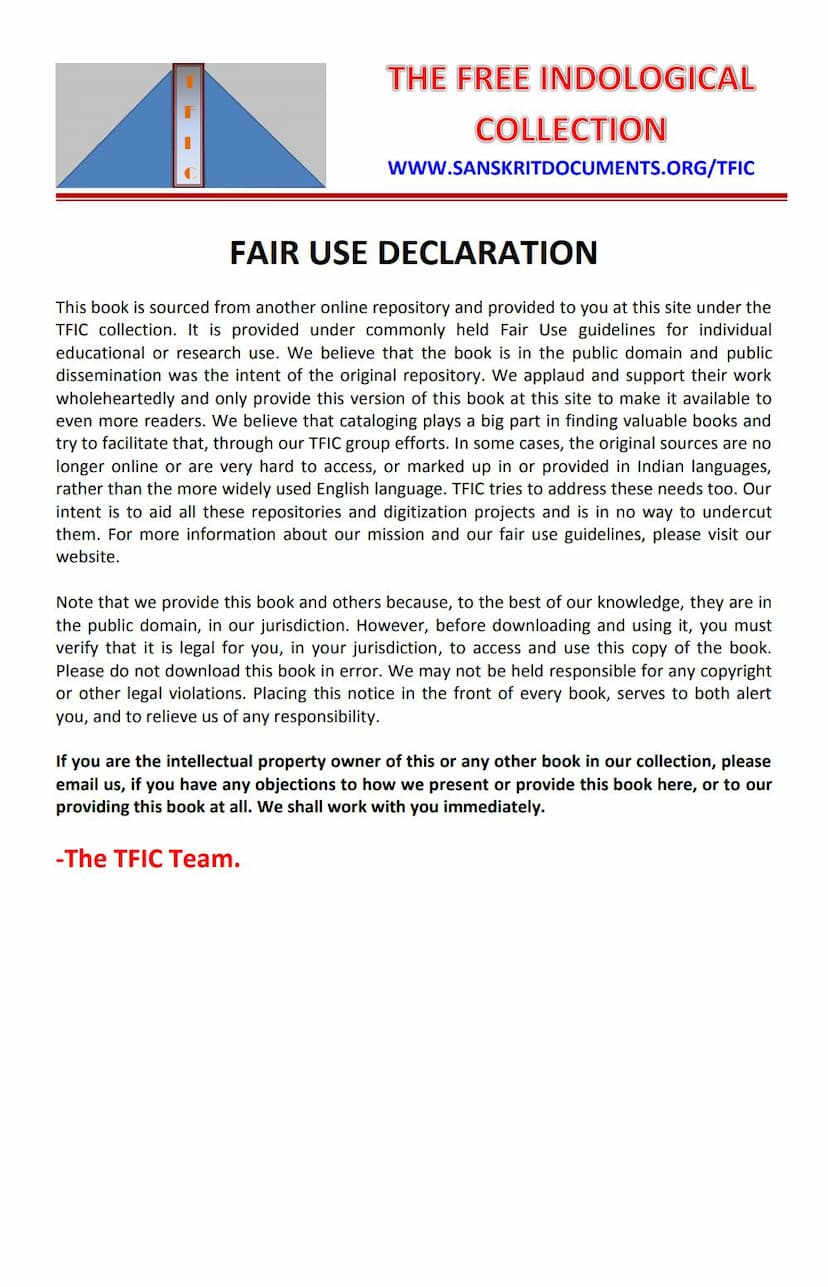Jain Bhajan Ratnavali
Added to library: September 1, 2025

Summary
Here's a comprehensive summary of the Jain text "Jain Bhajan Ratnavali" by Nyamatsinh Jaini, based on the provided pages:
Overall Purpose and Context:
"Jain Bhajan Ratnavali" (meaning "Jewel Treasury of Jain Devotional Songs") is a collection of devotional songs (bhajans) in Hindi, compiled and authored by Nyamatsinh Jaini. The book serves as a compendium of spiritual poetry intended for the edification and devotion of Jains. It appears to be part of a series ("Niamat Singh Jain Tract Series-No. 2") and was published by the author himself, indicating a personal effort to promote Jain teachings and devotion. The collection includes a variety of styles and themes, primarily focusing on the glorification of Jain Tirthankaras, core Jain principles, and ethical conduct.
Key Themes and Content:
The book is structured as a collection of devotional songs, each with specified ragas (melodies) and talas (rhythms) for singing. The content can be broadly categorized as follows:
- Praise of Tirthankaras: A significant portion of the collection is dedicated to praising the 24 Jain Tirthankaras (spiritual conquerors). Each Tirthankara is mentioned, often with their attributes, virtues, and the impact of their teachings. For example, there are verses praising Rishabhdev, Ajitnath, Shambhavnath, and Mahavir.
- Core Jain Principles and Philosophy: The bhajans touch upon fundamental Jain concepts such as:
- Ahimsa (Non-violence): Emphasized as a supreme virtue, with warnings against causing harm.
- Karma: The law of karma and its influence on one's destiny is mentioned.
- Moksha (Liberation): The ultimate goal of spiritual pursuit, the path to which is a recurring theme.
- Right Faith and Conduct (Samyak Darshan, Samyak Charitra): The importance of correct understanding and ethical living is highlighted.
- Sadvidya (True Knowledge): The value of spiritual knowledge and education is promoted, especially for women.
- Renunciation (Vairagya): The detachment from worldly possessions and desires for spiritual advancement.
- Ethical Living and Social Commentary: Some bhajans offer advice on ethical behavior, cautioning against vices and promoting virtuous actions. There are instances of social commentary, lamenting the decline of Jain values in the current era (Kaliyuga) and advocating for the revival of these principles.
- Devotion and Surrender: Many songs express deep devotion to Jain deities and leaders, with a sense of surrender and seeking divine grace.
- Praise of Jain Agamas (Scriptures): The sacred words of the Jain scriptures (Jin Vani) are venerated.
- The Nature of the Soul (Atma): A significant portion of the latter part of the book, notably the bhajans contributed by Chaudhary Dalluram "Kosari," focuses on the nature of the soul. These verses explore the soul's eternal, pure, and self-sufficient nature, independent of the body and worldly attachments. The soul is described as being all-pervading, beyond birth and death, and the true essence of existence.
- Specific Occasions and Dedications: Some bhajans are noted as being composed for specific occasions or dedicated to individuals, such as a ghazal for a wedding.
Literary Style and Structure:
- Variety of Melodies and Rhythms: The collection showcases a diverse range of musical structures, with specific ragas and talas indicated for each bhajan, suggesting they are meant to be sung.
- Vernacular Language (Hindi): The bhajans are written in Hindi, making them accessible to a wide audience.
- Poetic Devices: The author employs various poetic devices, including metaphors, similes, and direct address, to convey spiritual messages effectively.
- Dohas and Chaupais: Traditional Indian poetic forms like Dohas (couplets) and Chaupais (quatrains) are interspersed throughout the collection.
Author's Mission and Contextual Notes:
- Nyamatsinh Jaini: The author, Nyamatsinh Jaini, identifies himself as the Secretary of the District Board, Hisar. This suggests he was a respected figure in his community and actively involved in social and administrative roles.
- Purpose of Publication: The publication of this book appears to be driven by a desire to promote Jainism and provide devotional material for the community.
- "Fair Use Declaration": The presence of a "Fair Use Declaration" indicates that the book was sourced from another online repository and provided under principles of fair use for educational and research purposes.
- Social Relevance: The inclusion of bhajans discussing the state of Jainism, the importance of education (especially for women), and the need for community unity highlights the author's awareness of and engagement with contemporary issues relevant to the Jain community.
- Collaboration: The inclusion of bhajans by Chaudhary Dalluram "Kosari" demonstrates a collaborative effort to enrich the collection with diverse spiritual perspectives, particularly on the nature of the soul.
In essence, "Jain Bhajan Ratnavali" is a valuable compilation of devotional songs that aims to inspire spiritual devotion, reinforce Jain ethical principles, and offer profound insights into the nature of the soul. It reflects the author's commitment to the propagation of Jain dharma and the spiritual well-being of its followers.